Flower Net Read online
Page 9
Hulan could practically tell the time and day of the week by the routine of the peddlers who passed through the hutong. The first voice she heard each morning was the bean-curd peddler’s as he made his early rounds. By the time she was ready for work, the prune-juice seller would have gone home with his jugs empty and his pockets jangling with coins. On certain days, the needle and thread salesman would visit, singing the praises of his wares in his nasal twang. Once a month, the knife and scissors sharpener would set up a temporary shop—really no more than a blanket, a satchel, and several honing blades.
Just as Hulan could mark time by the movements of these peddlers, she could also predict the arrival of the local busybody, Neighborhood Committee Director Zhang Junying, whose business it was to watch everyone in this honeycomb of compounds. Hulan heard the gate creak open just as the tea reached its full fragrant strength.
Zhang Junying’s hair was thinning and dyed an almost purple black. She kept it in a tidy bun held in place by a black hair net at the nape of her neck. She was short, plump, and waddled when she walked. Zhang Junying settled her ample grandmotherly form into a chair and reached for a salted plum. She popped the sour morsel in her mouth, then got to the purpose of her visit. “Inspector Liu, I have noticed your absence more than usual.”
“Don’t worry, auntie. I have been working.”
“You’re always working! What else is new? But this new case…”
“Don’t let them scare you, auntie.”
The old woman frowned. “They say, ‘You watch out for Inspector Liu. She will be working with a foreign devil. You watch for any changes.’”
“You shouldn’t tell me this.”
“Your family, my family, we have been neighbors for many generations,” Zhang Junying cackled. “You think I care what those people tell me?”
“You’re the one who needs to be careful,” Hulan teased.
“I’ll never get caught in a changing tide,” she countered, and Hulan, who had known this woman all her life, knew she was right.
“Thank you for warning me,” Hulan said lightly.
The old woman turned serious again. She took a noisy sip of tea to show her appreciation and approval of the drink. She set the cup down, then clapped her hands to her widespread knees. “You do not have to work so many long hours,” she stated, and Hulan knew that while Madame Zhang appeared to be staying on the same subject, the conversation had taken a subtle, inevitable turn.
“I do what my superiors tell me to do,” Hulan replied.
Zhang Junying’s wizened face crinkled. “What do old men know about young women? Pretty soon, you are too old to have children. No one will marry you then.”
“Maybe I don’t want to marry…”
“Aiya! You always were a stupid girl!”
“Too stupid to be a good wife. This is true.”
“This is a problem,” the old woman agreed, then brightened. “I know what! You know the Kwok family? They are an old family. They have a son. Forty-five years old.”
“He’s the one too old to marry!”
“No, no, he is a good son.”
“What does he do?”
“See? You are thinking like a bride.” Zhang slapped her hands on her knees. “That’s good.”
“Not like a bride,” Hulan corrected, “like a fat pig before Spring Festival.”
Zhang Junying croaked a phlegmy laugh. “You are a funny girl. You should be married. Make your husband laugh. Better yet, you make your mother-in-law laugh.”
As the two women bantered, Liu Hulan mentally ticked off a list: Am I dressed right? Should I carry my gun or keep it in my desk? Does my hair still shine? Can I keep my voice steady? Over the years, Liu Hulan had perfected the art of keeping her emotions in check, of hiding her thoughts, of presenting a placid facade to the world. It was how she survived.
After an early lunch, David was picked up by Peter and whisked away in the Saab. “Your appointment is at one,” Peter announced as he honked at a caravan of camels loaded with goods as they loped through the traffic. After a few turns, the boulevard widened and Peter’s pace quickened. Suddenly everything opened up and David saw the vast emptiness of Tiananmen Square on the left and the deep-red fortress of the Forbidden City on the right. On the square, a group of Western tourists stood in a dejected cluster with their cameras and tote bags, men in dull green army uniforms carried machine guns, and a few old women swept the expanse with homemade bamboo brooms.
Peter turned right, down an alley that ran alongside the Forbidden City, then made three consecutive lefts, so that they circled the old imperial palace. Stark dismissed this as a quick tour until Peter went around the block again. Noticing his look in the rearview mirror, Peter gave David his first inkling of how Chinese officials would deal with him on this trip. “You’re not expected for another ten minutes,” Peter explained. Everything David did would be controlled to the minute.
Peter escorted David through the Ministry of Public Security’s damp halls and into Vice Minister Liu’s office promptly at one. Amid handshakes and hearty welcomes, David quickly took in his surroundings—the plushness of the office, the obsequiousness of the vice minister, and the cautious manner of Section Chief Zai.
“We are honored to meet you,” Liu said with a slight bow after introductions were made, “and honored that the United States has sent to us one of its finest lawyers to help in solving this horrible crime against one of our most respected citizens.”
“It is an honor for me as well,” David responded with a similar tip of his head.
“Surely we are two great nations united in the pursuit of a common goal.”
As they stood exchanging stilted pleasantries, David felt like a gangly teenage boy—not knowing the right words and feeling very uncomfortable in his suddenly very large body.
But from her vantage point in the doorway, Hulan saw a very different figure. David Stark stood with his side to her so he couldn’t see her as she observed him. How little he had changed in twelve years. He still had what she’d always thought of as a runner’s body, lean and long. Only his brown hair seemed to have changed—now showing a little gray at the temples. He was tall compared to her father and mentor but of average American height. Like the two older men, he wore a Western-style suit, but how dissimilar he looked from them.
David had the comfortable physical looseness that came with political freedom and regular exercise. Under his strained, formulaic words, the warmth of his voice cut across the time of their separation. She took a final moment to calm her breathing, smooth her hands along the slim lines of her skirt, and compose a look of serenity on her face.
As she stepped forward, her father and Zai regarded her with enough interest that David turned in her direction. When Zai introduced her as the inspector in charge of the Chinese investigation, David’s face paled, then flushed.
“Hulan,” he breathed.
“David Stark,” she said, taking his hand firmly. “It’s been many years. How wonderful to see you again.” She hoped her businesslike demeanor would give him the time he needed to realize that he shouldn’t act on impulse. (She didn’t know what that would be exactly. Would he take her in his arms? Would he be as stiff as she? Or would he walk out and disappear from her life as she had from his?)
“This is a surprise,” he said.
“Yes, how fortuitous,” Vice Minister Liu said. “We are old friends here, are we not?”
Without taking his eyes off Hulan, David spoke with chilly formality. “Old friends, new friends. It makes no difference. As you said, Vice Minister, we are here to work together as two nations united by a common goal. I’m sure we’d all like to see the Rising Phoenix come to justice. Perhaps you can tell me about your progress.”
An awkward silence followed. David had unknowingly made his first mistake, Hulan thought. He had openly spoken about a touchy subject, which, in turn, elicited an immediate loss of face for her two superiors.
“Unfortunatel
y, we have been unlucky in prosecuting the Rising Phoenix,” Section Chief Zai said finally.
“But we hope that through this new affiliation we will reach a satisfactory conclusion,” Vice Minister Liu added smoothly. “Please be assured that we at the Ministry of Public Security will be watching the two of you in your pursuit. If there’s anything you need from us, please inform Section Chief Zai and he will provide it.” When no one spoke, he unceremoniously closed the meeting. “There’s nothing more to say at this time. Inspector Liu, I suggest that the two of you begin.”
Hulan was conscious of David’s nearness as they walked down the deserted hallway. She began muttering more to herself than to him. “No courtesy. No manners. They didn’t give you tea. They didn’t suggest a meal. They didn’t even offer you a seat.”
David’s mind was far away from the slights that she’d perceived. “Hulan, I can’t believe it’s you.” He spoke softly. She never hesitated in her step, never turned to look at him, but kept her eyes focused on the worn linoleum before her. She surreptitiously shook her head. David followed her down one flight and then halfway down a second. Convinced that they were really alone, Hulan stopped and turned to face him. She pulled gently on his upper arm, bringing his face close enough that she could feel his breath.
“This isn’t a safe place for us to talk.” The syllables came out low and raspy. “I know it’s hard, but we have to be careful, okay?”
She let go of his arm, turned, and continued on to her office. She put on her coat and suggested he do the same. Then she sat down, motioned for him to take the chair opposite her desk, pulled out a file, and opened it. “We should get to work,” she said, then slowly moved her gaze from the manila folder, across the desk, and up into the depth of his eyes.
As he clinically recounted his investigation of the China Peony, his gruesome discovery of the body, and the eventual identification of Guang Henglai, he watched as her face shifted from interest to disgust to concern. As she spoke with dispassion about the discovery of Billy Watson and his parents’ differing yet strange reaction to his death, David’s face mirrored her own confusion. (She didn’t mention that she’d been pulled off the case—that would only raise questions whose answers would not show the Chinese government in a positive light.) Through it all, they sounded politely professional, so that anyone listening would glean nothing of their past relationship other than cool civility. Anyone in the room, however, would have felt the tension of restrained emotions.
“I understand from the vice minister that your pathologist found a residue in Henglai’s lungs similar to what we found,” Hulan ventured. She was careful not to use her father’s full name. David hadn’t made the connection and she didn’t want to tell him. She’d have enough trouble working with him without her odd family history coming into it. “Was he able to determine what it was?”
“Not exactly. He thinks it’s from some type of insect and that it’s extremely toxic. But other than that, nothing. How about your guy?”
A frown crossed Hulan’s features, but her voice was businesslike as she replied, “Pathologist Fong noted that the teeth and fingernails had turned a dark color unlike anything he had seen before. Did your pathologist find something similar?”
David vividly remembered the color of Guang Henglai’s teeth grinning out at him as he lay in the hold of the China Peony. “Our coroner dismissed that as some sort of degradation consistent with the extended period of decomposition.”
David expected Hulan to add to her report, but she only made a slight humming sound followed by “We were unable to perform forensic tests.”
David waited for more, but Hulan kept her silence.
“Tell me what you know about the Rising Phoenix,” David said after a moment.
Hulan sighed. This was another subject she would have to be careful with. “Section Chief Zai has ordered various investigations of the Rising Phoenix. I haven’t worked on them, but I do know that they have not been successful.”
“It’s hard to get anyone to talk,” David said. “No one wants to betray the gang.”
“Actually,” she said cautiously, “we’ve come quite close several times, but the Rising Phoenix always seems to know we’re coming.”
“You think they’re getting inside information?”
“Could be. Everything’s for sale in China.”
“What kind of evidence have you gathered?”
“I don’t know,” she answered. “Like I said, I haven’t worked on those cases.”
“But with what I know maybe we can put something together,” he offered.
“Perhaps,” she said. “It doesn’t take much evidence to get a conviction in China, but whatever facts we’ve gotten have never been enough for the vice minister.”
“Then we’ll have to find them,” David concluded.
Their eyes met again. Hulan fought the impulse to talk about more personal matters.
David cleared his throat, looked away, and said, “Inspector Liu, this is your turf and your investigation. What do you suggest we do next?”
“What would you do if you were me?”
“I think we should start with the parents.”
“Ambassador Watson is a difficult man.”
David shrugged. “He’s a politician, too, and we have to assume that he’s not stupid. This is a highly unusual situation. I suspect that he’ll recognize that and see us. What about the boy’s mother?”
“I think we’ll do better if we interview Mrs. Watson alone, but I’m not sure how to arrange that. Her husband seems very much in control.”
“Friends?”
“I know of none, but I haven’t looked.”
“That doesn’t sound like you.” The words were out of his mouth before he could think.
Another awkward silence filled the room. Finally, Hulan spoke. “The grass points where the wind blows. In China, I do what I’m told. I obey my superiors, especially in political matters. Do you understand?” She paused, then continued. “I have waited for your arrival to speak with Guang Henglai’s family.”
“What can you tell me about Guang Mingyun?”
“He is an important businessman in our country. You would not be here if not for him.”
“And his son was considered a Red Prince?”
“That is not a term I like to use.”
“Nevertheless…”
“Nevertheless,” Hulan acceded.
The afternoon wore on. The room became darker and colder as whatever sunlight there had been disappeared behind the thickening cloud cover. Hulan turned on her desk lamp and tried to come up with another subject. But they had said all there was to say about the case, and this wasn’t the place to talk about the past.
“What do you want me to do now?” he asked.
“I think it will be best if Peter takes you back to the hotel.” David shook his head, but Hulan continued, “You are in China. I will make our appointments.” She stood and extended her hand. “Tomorrow then?”
“Hulan…”
“Good,” she said, reluctantly loosening her hand from his. She crossed to the door and held it open. “I will leave a message for you at your hotel telling you the time.”
Peter, who waited just outside the door, jumped to his feet, spoke in rapid Chinese to Hulan, then led Stark back through the maze of corridors and stairwells to the courtyard. In her office, Hulan stood with her back against the closed door, trying to catch her breath.
By the time Hulan left her office it was already dark. She buttoned her coat against the cold and draped a scarf over her head. Others in the building hurried to their bicycles. She was aware of how they kept their distance, how they ignored her as she walked with them along the length of the bicycle park.
She hitched up her skirt, swung her leg over her silver-blue Flying Pigeon, pedaled out of the compound, and melted into the anonymity of hundreds of her countrymen commuting home. How peaceful this was compared to the fits and starts of Peter’s driving.
The smooth, quiet rhythm of her own bicycle among hundreds of others all around her became a soothing meditation.
She relished those moments when she stopped at a traffic light and was able to witness the city’s domestic life. On a street corner stood a cart laden with candied crab apples on bamboo skewers. On another, a man grilled fragrant strips of marinated pork. On yet another, a small crowd of people clustered around a kiosk to slurp redolent noodles from enameled tin bowls before handing the empties back to the proprietor.
Hulan parked in front of one of the city’s new high-rise apartment buildings. She rode the elevator to the fifteenth floor and knocked on a door at the end of the hallway. A maid escorted Hulan into the living room. There was little in this room to suggest the personalities of the people who lived here. The couch was covered in a polyester floral print. Several straight-backed chairs were grouped around a low coffee table. Plastic plants collected dust in wicker baskets. Oil paintings of decidedly Western landscapes hung on the walls.
A woman sat in a wheelchair staring out the window.
“How is she today?” Hulan asked the maid, taking off her coat. She much preferred the cold of old buildings like her hutong home and public facilities to the overheated rooms of the new apartments and Western-style hotels that had sprung up in recent years.
“Quiet. No change.”
Hulan crossed the room, knelt next to the wheelchair, and gazed up into her mother’s face. Jiang Jinli stared into the middle distance. Hulan gently reached for her mother’s hand. The skin was translucent and Hulan traced the delicate veins with a finger.
“Hello, Mama.”
There was no response.
Hulan pulled a porcelain garden stool to her mother’s side and began talking about her day. “I had an interesting visitor, Mama. I think you remember me talking about him before.”

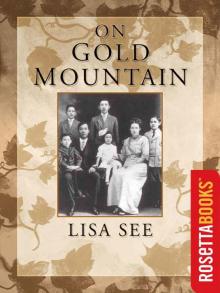 On Gold Mountain: The One-Hundred-Year Odyssey of My Chinese-American Family
On Gold Mountain: The One-Hundred-Year Odyssey of My Chinese-American Family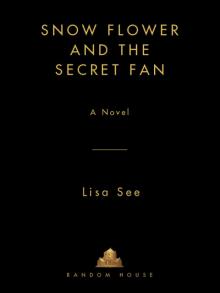 Snow Flower and the Secret Fan
Snow Flower and the Secret Fan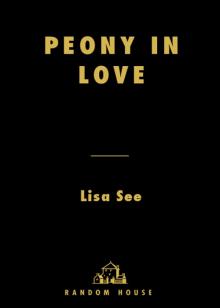 Peony in Love
Peony in Love Flower Net
Flower Net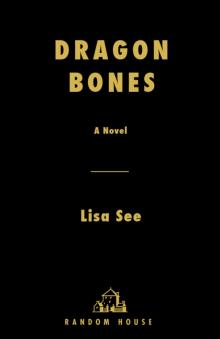 Dragon Bones
Dragon Bones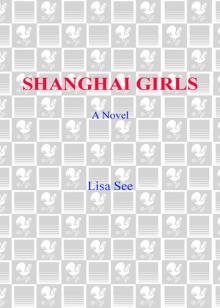 Shanghai Girls
Shanghai Girls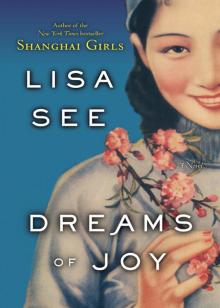 Dreams of Joy
Dreams of Joy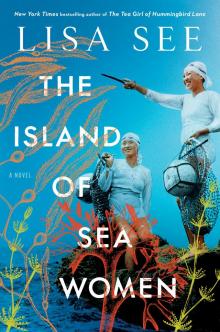 The Island of Sea Women
The Island of Sea Women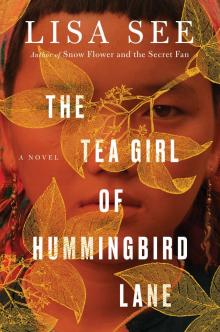 The Tea Girl of Hummingbird Lane
The Tea Girl of Hummingbird Lane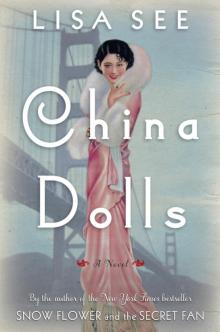 China Dolls
China Dolls The Interior
The Interior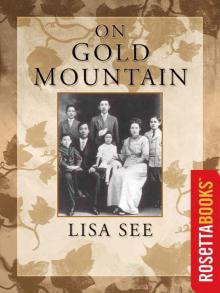 On Gold Mountain
On Gold Mountain